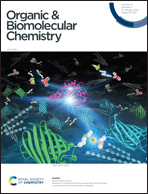A TD-DFT study of a class of D–π–A fluorescent probes for detection of typical oxidants†
Abstract
A deep understanding of the fluorescence response mechanisms is the foundation for design-oriented strategies for D–π–A probes for trace hazardous chemicals. Here, from the perspective of electronegativity regulation of the π-bridge recognition site, an electron-donation modulation strategy involving various comprehensive evaluations of the optical and chemical properties is proposed through a series of theoretical analyses. Due to the preferential combined interaction between the π-bridge recognition site and MnO4−, high electrophilic reactivity and feasible chemical reaction energy barrier, a high-performance filter paper chip and hydrogel chip for the detection of aqueous and air-suspended environmental KMnO4 was achieved. We expect the present modulation strategy will facilitate efficient fluorescent probe design and provide a universal methodology for the exploration of functional D–π–A molecules.



 Please wait while we load your content...
Please wait while we load your content...